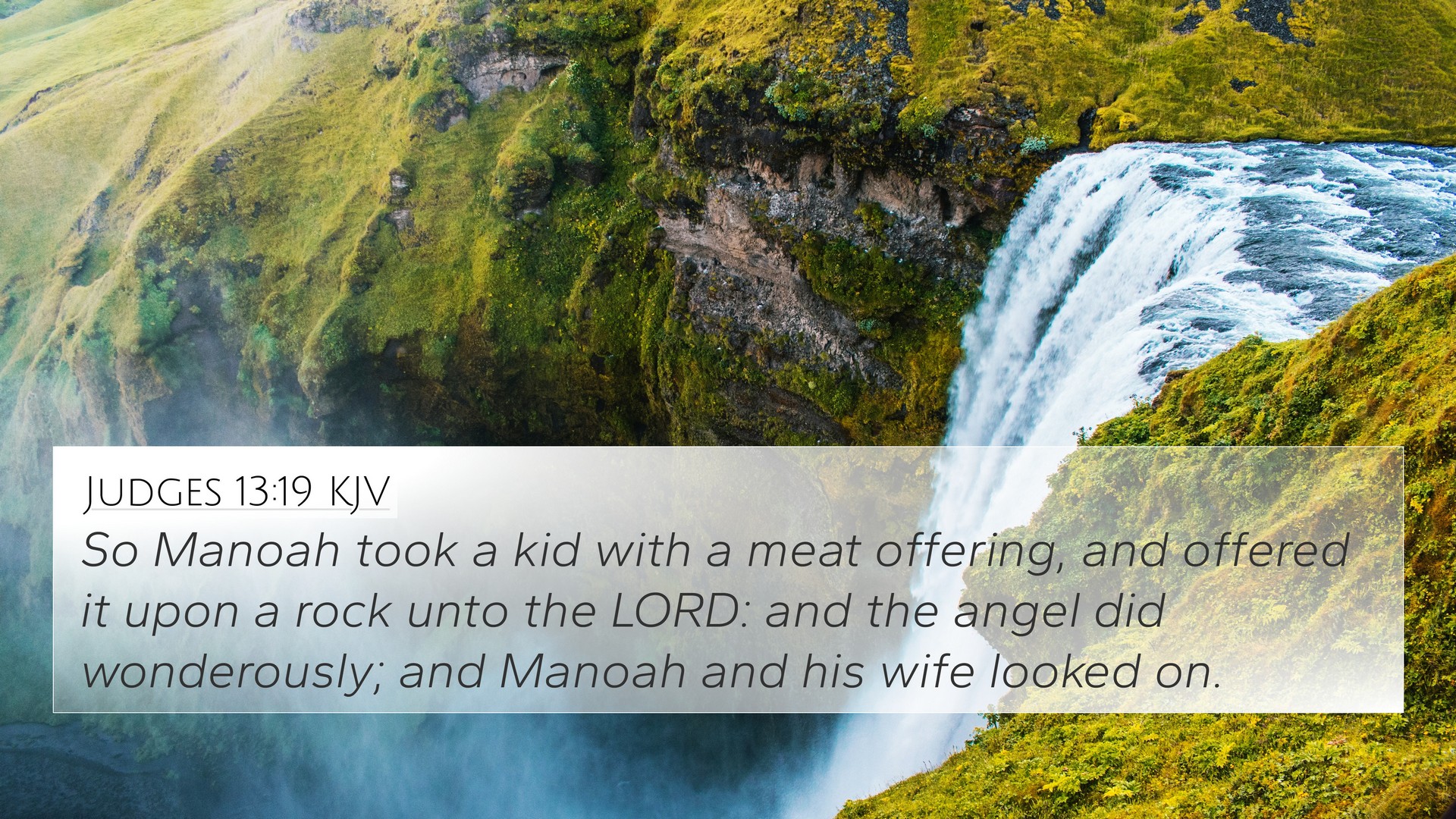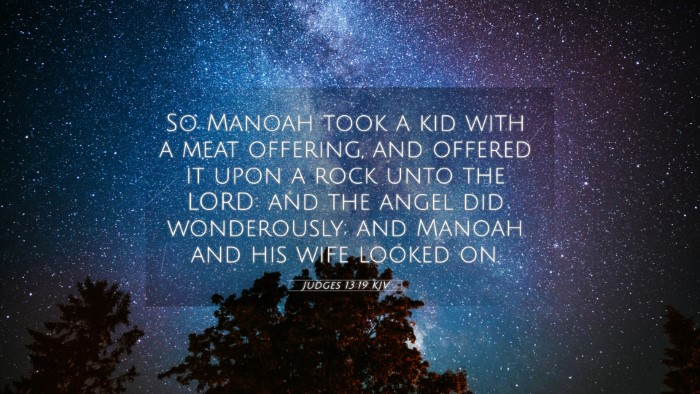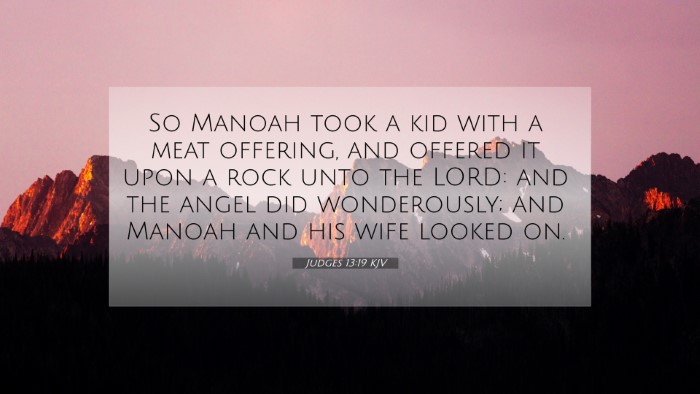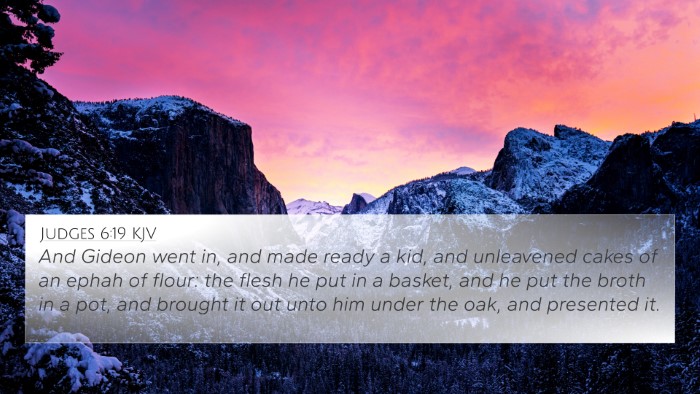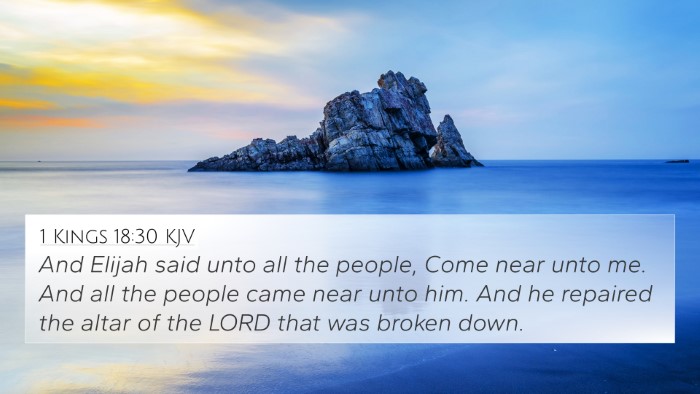Bible Verse Meaning for Judges 13:19
Judges 13:19 states: "So Manoah took the kid with the meat offering, and offered it upon a rock unto the Lord: and the angel did wondrously; and Manoah and his wife looked on."
This verse encapsulates an important moment in biblical history where Manoah presents a sacrifice to God. The actions of Manoah and his wife provide a multifaceted understanding that can be explored through various commentaries.
Summary of Insights
Matthew Henry's Commentary: Matthew Henry emphasizes the significance of Manoah's obedience and faithfulness in presenting a sacrifice. He notes that the sacrifice indicates Manoah's recognition of God's authority and power. Henry interprets the act of sacrifice as a means of communion with God and highlights that it leads to divine revelation. He points out that the presentation of the sacrifice and the awe-inspiring response from the angel symbolize the direct interaction God has with His chosen individuals.
Albert Barnes' Notes: Albert Barnes elaborates on the purpose of Manoah's offering, framing it as an act of worship rather than mere duty. Barnes mentions that the angel’s wondrous deeds serve to confirm God’s promise regarding Manoah and his wife's future son, Samson. Barnes also emphasizes the notion that true worship often comes from a place of humility and gratitude, mirroring the relationship between God and His people.
Adam Clarke's Commentary: Clarke offers additional insights by highlighting the context of lack—Manoah and his wife were seeking assurance regarding their impending son, who was appointed to deliver Israel. He suggests that the presentation of the offering on a rock symbolizes the enduring strength and faith required to face the unknown. Clarke further discusses the implications of the angel’s wondrous response as a "theophany," a visible manifestation of God to mankind, suggesting that this divine interaction reassures the couple of their unique purpose.
Cross-References Related to Judges 13:19
Understanding Judges 13:19 is enhanced through the following Bible cross-references:
- Genesis 22:2 - Abraham's willingness to sacrifice Isaac shows the theme of faith and obedience.
- Exodus 29:18 - Instructions on burnt offerings demonstrate the importance of sacrificial worship.
- 1 Samuel 13:9 - Saul’s unlawful sacrifice reflects the necessity of following God’s commands.
- Romans 12:1 - Paul calls believers to present their bodies as living sacrifices, echoing the theme of dedicated worship.
- Hebrews 11:32-34 - Mentions of the faith of various leaders, including Samson, affirm Manoah's expectations.
- 1 Kings 18:36-37 - Elijah's sacrifice demonstrates God's response to sincere devotion.
- Revelation 8:3-4 - The symbolism of angels receiving sacrifices aligns with divine interactions recorded in scripture.
- Judges 13:8 - Manoah’s prayer for instruction indicates a desire for clarification on God’s plans.
- Luke 1:13 - Similar patterns of miraculous announcements tie into the prophetic nature of childbirth for special purposes.
- Acts 10:4 - Cornelius’s prayers and alms showcased how God honors sincere offerings.
Thematic Connections
The theme of divine intervention through offerings is prevalent throughout the Bible. The act of Manoah’s sacrifice resonates with various biblical narratives where offerings symbolize devotion and faith. For instance, the linkage between Old Testament sacrifices and New Testament spiritual offerings forms a profound narrative about God’s engagement with humanity.
Moreover, the offering made by Manoah can be understood as part of a larger biblical motif depicting the relationships formed through sacrifice—culminating in Jesus Christ's ultimate sacrifice. The connections between Judges 13:19 and these related verses present a rich inter-Biblical dialogue that invites readers to explore how worship, obedience, and divine communication are woven throughout the biblical text.
Conclusion
Judges 13:19 serves as a critical verse in understanding the interaction between God and His faithful followers through the lens of sacrifice. The insights provided by various biblical commentators, along with the cross-references mentioned, facilitate a deeper exploration of the themes of obedience, worship, and divine purpose in biblical history. By examining these connections, readers can gain a broader perspective on the significance of this passage, allowing for more profound engagement with Scripture.
